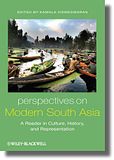Perspectives on Modern South Asia
Visweswaran, Kamala [Hrsg.]:
Perspectives on modern South Asia : a reader in culture, history, and representation / ed. and introduced by Kamala Visweswaran. - Malden : Wiley-Blackwell, 2011. - ca. 400 S.
ISBN 978-1-4051-0062-5
£ 60,00 / EUR 72,00 (Hardcover)
ISBN 978-1-4051-0063-2
£ 24,99 / EUR 30,00 (Paperback)
DDC: 954
-- Angekündigt für April 2011 --
Beschreibung
Perspectives on Modern South Asia presents an exciting core collection of essays drawn from anthropology, literary and cultural studies, history, sociology, economics, and political science to reveal the complexities of a region that is home to a fifth of humanity.
- Presents an interdisciplinary overview of the origins and development of the eight nations comprising modern South Asia: Afghanistan, Bhutan, Bangladesh, India, the Maldives, India, Pakistan, and Sri Lanka
- Explores South Asia’s common cultures, languages and religions and their relationship to its ethnic and national differences
- Features essays that provide understandings of the central dynamics of South Asia as an important cultural, political, and economic region of the world
Herausgeberin
KAMALA VISWESWARAN is Associate Professor of Anthropology and South Asian Studies at the University of Texas, Austin. She is the author of Fictions of Feminist Ethnography (1994), Uncommon Cultures (2010), and the forthcoming A Thousand Genocides Now: Gujarat in the Modern Imaginary of Violence. Profile page.
Quellen: Wiley; WorldCat; Amazon; Google Books; Library of Congress
Ähnlich
- Llewellyn-Jones: Last King in India
- After Timur Left
- Fischer-Tiné: Shyamji Krishnavarma
- Biedermann: The Portuguese in Sri Lanka and South India
- Cederlöf: Founding an Empire on India's North-Eastern Frontiers
- Kingship in Kaśmīr (AD 1148–1459)
- Francis: Le discours royal dans l'Inde du Sud ancienne 1
- Horstmann: Jaipur 1778
- Avelar: História de Goa
- Paranjape: Making India

